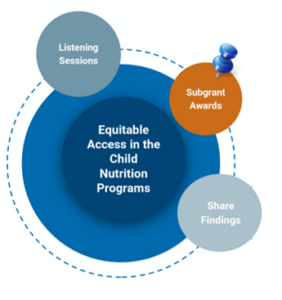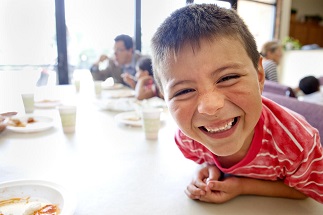Equitable Access in Child Nutrition Programs RFP Is Now Closed
For more information, visit our RFP page.
The Food Research & Action Center (FRAC) was awarded a $2 million cooperative agreement from the U.S. Department of Agriculture (USDA) to conduct and support research on expanding equitable access to the federally-funded child nutrition programs. This project will run through December 2025.
Child Nutrition Programs: Critical for Child Health & Learning
Research shows the value of the child nutrition programs. They help reduce childhood hunger, decrease childhood obesity, improve child nutrition and wellness, support academic achievement, and enhance child development and school readiness.
Despite their benefits, too few eligible children participate, and the services delivered may vary by community. National data consistently shows that Black and Latinx households with children are more likely to report food insecurity. The COVID-19 pandemic has also further exacerbated inequities for historically and currently marginalized communities.

Equitable Access in Child Nutrition Programs: Project Goals
Through the Equitable Access in Child Nutrition Programs Project, FRAC will identify, support, and share research on barriers to participation and equitable service delivery in child nutrition programs, including the National School Lunch Program, School Breakfast Program, Fresh Fruit and Vegetable Program, Summer Food Service Program, Seamless Summer Option, and Child and Adult Care Food Program.
Goal 1

Identify barriers that participants, potential participants and/or program operators, especially in underserved communities, may face when accessing or attempting to access any child nutrition program.
Goal 2

Identify circumstances that may result in inequitable delivery of services.
Goal 3

Identify strategies that can address barriers to participation and strategies that can address barriers to equitable service delivery.
Goal 4

Generate evidence of efficacy of interventions to improve access to CN programs and/or equitable service delivery within programs.
Equitable Access in Child Nutrition Programs:
Subgrant Projects Announced
This effort will be comprised of diverse subgrantees, including a public health department, institutions, and community-based organizations. Learn more here.
-
- Feeding Kentucky (Kentucky): The nonprofit will research the barriers that exist on the state agency, sponsor, and site level in accessing summer meals (including non-congregate meals) and Summer EBT, with a specific focus on rural access.
- Hunger Solutions Minnesota (Minnesota): The nonprofit will investigate the impact of Minnesota’s Free School Meals for All program on Black, American Indians, and Latinx youth, including the positive effects of the program and the barriers that students face accessing school meals.
- Johns Hopkins University (Maryland): The university will create new measures of school meal quality with an equity lens, including the perceived quality of school meals and cultural relevancy of school meals through the National School Lunch Program and School Breakfast Program.
- San Antonio Metropolitan Health District (San Antonio, Texas): The public health agency will investigate the systemic barriers and social and environmental factors that prevent Black and Latino youth (ages 12-18) in low-income and low food access areas of San Antonio from participating in the Summer Food Service Program and Afterschool Meal Program.
- Trustees of Indiana University (Nationwide): The university will study the disparities that exist in CACFP participation and the inequities contributing to CACFP utilization amongst center-based Early Care and Education providers.
Stay Involved
Through this project, FRAC will:
-
- hold listening sessions with school meals, out-of-school time meals, and CACFP stakeholder groups to determine priority areas of research;
- provide competitive regrants to organizations to conduct research projects;
- develop a community of practice for subgrantees and provide programmatic and evaluation technical assistance; and
- disseminate updates, findings, and project data throughout.

Defining Equity
The term “equity” means the consistent and systematic fair, just, and impartial treatment of all individuals, including individuals who belong to underserved communities that have been denied such treatment, such as Black, Latino, Indigenous and Native American persons, Asian Americans and Pacific Islanders, and other persons of color; members of religious minorities; lesbian, gay, bisexual, transgender, and queer persons; persons with disabilities; persons who live in rural areas; and persons otherwise adversely affected by persistent poverty or inequality.
Resources

Equitable Access in the Child Nutrition Programs Project RFP
View the RFP
Equitable Access in the Child Nutrition Programs Fact Sheet
Read the fact sheet
FRAC Receives $2 Million Grant from U.S. Department of Agriculture to Support Equitable Access to Child Nutrition Programs
Read the press release
